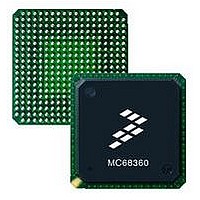MC68EN360CAI25L Freescale Semiconductor, MC68EN360CAI25L Datasheet - Page 466

MC68EN360CAI25L
Manufacturer Part Number
MC68EN360CAI25L
Description
IC MPU QUICC 25MHZ 240-FQFP
Manufacturer
Freescale Semiconductor
Series
MC68000r
Datasheets
1.MC68EN302AG20BT.pdf
(8 pages)
2.MC68EN360VR25L.pdf
(14 pages)
3.MC68EN360VR25L.pdf
(2 pages)
4.MC68EN360CAI25L.pdf
(962 pages)
Specifications of MC68EN360CAI25L
Processor Type
M683xx 32-Bit
Speed
25MHz
Voltage
5V
Mounting Type
Surface Mount
Package / Case
240-FQFP
Core Size
32 Bit
Cpu Speed
25MHz
Embedded Interface Type
SCP, TDM
Digital Ic Case Style
FQFP
No. Of Pins
240
Supply Voltage Range
4.75V To 5.25V
Rohs Compliant
Yes
Family Name
M68xxx
Device Core
ColdFire
Device Core Size
32b
Frequency (max)
25MHz
Instruction Set Architecture
RISC
Supply Voltage 1 (typ)
5V
Operating Supply Voltage (max)
5.25V
Operating Supply Voltage (min)
4.75V
Operating Temp Range
-40C to 85C
Operating Temperature Classification
Industrial
Mounting
Surface Mount
Pin Count
240
Package Type
FQFP
Lead Free Status / RoHS Status
Lead free / RoHS Compliant
Features
-
Lead Free Status / Rohs Status
Compliant
Available stocks
Company
Part Number
Manufacturer
Quantity
Price
Company:
Part Number:
MC68EN360CAI25L
Manufacturer:
APLHA
Quantity:
12 000
Company:
Part Number:
MC68EN360CAI25L
Manufacturer:
Freescale Semiconductor
Quantity:
10 000
Part Number:
MC68EN360CAI25L
Manufacturer:
FREESCALE
Quantity:
20 000
- MC68EN302AG20BT PDF datasheet
- MC68EN360VR25L PDF datasheet #2
- MC68EN360VR25L PDF datasheet #3
- MC68EN360CAI25L PDF datasheet #4
- Current page: 466 of 962
- Download datasheet (4Mb)
Serial Communication Controllers (SCCs)
Since the transmitter and receiver work asynchronously, there is no need to connect trans-
mit and receive clocks. Instead, the receiver oversamples the incoming data stream (usually
by a factor of 16) and uses some of these samples to determine the bit value. Traditionally
the middle three samples of the sixteen samples are used. Two UARTs can communicate
using a system like this if parameters, such as the parity scheme and character length, are
the same for both transmitter and receiver.
When data is not transmitted in the UART protocol, a continuous stream of ones is transmit-
ted, called the idle condition. Since the start bit is always a zero, the receiver can detect
when real data is once again present on the line. UART also specifies an all-zeros character
called a break, which is used to abort a character transfer sequence.
Many different protocols have been defined using asynchronous characters, but the most
popular of these is the RS-232 standard. RS-232 specifies standard baud rates, handshak-
ing protocols, and mechanical/electrical details. Another popular standard using the same
character format is RS-485, which defines a balanced line system allowing longer cables
than RS-232 links. Synchronous protocols like HDLC are sometimes defined to run over
asynchronous links. Other protocols like Profibus extend the UART protocol to include LAN-
oriented features such as token passing.
All the standards provide handshaking signals, but some systems require just three physical
lines: transmit data, receive data, and ground.
Many proprietary standards have been built around the asynchronous character frame, and
some even implement a multidrop configuration. In multidrop systems, more than two sta-
tions may be present on a network, with each having a specific address. Frames made up
of many characters may be broadcast, with the first character acting as a destination
address. To allow this, the UART frame is extended by one bit to distinguish between an
address character and the normal data characters.
Additionally, a synchronous form of the UART protocol exists where start and stop bits are
still present, but a clock is provided with each bit, so the oversampling technique is not
required. This mode is called "isochronous" operation or, more often, synchronous UART.
7-142
8 ,16 , OR 32
UART TCLK
UART TXD
START
BIT
Freescale Semiconductor, Inc.
Figure 7-46. UART Character Format
For More Information On This Product,
MC68360 USER’S MANUAL
Go to: www.freescale.com
5, 6, 7, OR 8 DATA BITS WITH THE
LEAST SIGNIFICANT BIT FIRST
ADDR.
OPTIONAL
BIT
(CLOCK NOT TO SCALE)
PAR.
BIT
9/16 TO 2
STOP BITS
Related parts for MC68EN360CAI25L
Image
Part Number
Description
Manufacturer
Datasheet
Request
R
Part Number:
Description:
Manufacturer:
Freescale Semiconductor, Inc
Datasheet:
Part Number:
Description:
Manufacturer:
Freescale Semiconductor, Inc
Datasheet:
Part Number:
Description:
Manufacturer:
Freescale Semiconductor, Inc
Datasheet:
Part Number:
Description:
Manufacturer:
Freescale Semiconductor, Inc
Datasheet:
Part Number:
Description:
Manufacturer:
Freescale Semiconductor, Inc
Datasheet:
Part Number:
Description:
Manufacturer:
Freescale Semiconductor, Inc
Datasheet:
Part Number:
Description:
Manufacturer:
Freescale Semiconductor, Inc
Datasheet:
Part Number:
Description:
Manufacturer:
Freescale Semiconductor, Inc
Datasheet:
Part Number:
Description:
Manufacturer:
Freescale Semiconductor, Inc
Datasheet:
Part Number:
Description:
Manufacturer:
Freescale Semiconductor, Inc
Datasheet:
Part Number:
Description:
Manufacturer:
Freescale Semiconductor, Inc
Datasheet:
Part Number:
Description:
Manufacturer:
Freescale Semiconductor, Inc
Datasheet:
Part Number:
Description:
Manufacturer:
Freescale Semiconductor, Inc
Datasheet:
Part Number:
Description:
Manufacturer:
Freescale Semiconductor, Inc
Datasheet:
Part Number:
Description:
Manufacturer:
Freescale Semiconductor, Inc
Datasheet:











